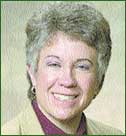|
Oct. 19, 2000 By Tom Vaughan
Kay Alexander doesn’t want voters to throw away her four years of experience representing District 58 (which includes voting precincts 1 through 5 in Montezuma County). "I think I have a very good knowledge of the issues my district is facing . . . (and I) have built a good working relationship with my colleagues," she said. The need for continuity in the legislature is especially strong now, she says, because of the changes that will be taking place due to term limits. Alexander has one opponent, Libertarian W. Dale Murphy. Like Murphy, she wants to see less government in people’s lives, but feels the Libertarians are "running against the federal government" and this is a state race. Alexander, 55, and her husband, Ben, live in Montrose. She grew up in Wisconsin, earning an undergraduate degree from the University of Wisconsin, Madison, and a master’s in social work from the University of Wisconsin, Milwaukee. For 25 years Alexander worked as a social worker in a variety of contexts, including child-protection services. She lived in Grand County for 15 years before moving to the Montrose area. Since 1994, Alexander has been vice president of HMC West, a marketing and public-relations firm, and she is also a rancher with membership in the Farm Bureau, Grange and other agricultural organizations. Alexander sees growth as a major issue for western Colorado. "If Amendment 24 passes, it will be even a greater issue," she said in a phone interview. Some counties in her district are having a difficult time economically, she said. There is a "need for diversification in crops" to enable agriculture to be economically viable, she believes. Increased tourism would also help, she said. Since the tourism tax was removed, "We have suffered greatly ... (We) have to find new ways of getting the word out." The new "configuration" of tourism committees hasn’t had time to kick in, Alexander said, but she’s "pleased that Montezuma County has received some money" following the fires. She also voiced concerns about improving transportation and telecommunication infrastructure locally: "We have let things go for 28 years" in transportation; the needs statewide are "incredible." In the field of telecommunications, Alexander believes, "Wegetting there, but we have to make sure our voice is being heard." Other issues she discussed included:
Alexander opposes all the voter initiatives proposed that will be on the Nov. 7 ballot, from Amendment 20 (medical use of marijuana) to Amendment 25 (requirements for informed consent to abortion) on the grounds that they should not be in the state constitution. She said Amendment 21 — tax cuts — "will be very dangerous for our special districts." "No, no, no, no!" was her response to Amendment 24 (voter approval of growth). "It will be the state mandating how local governments deal with growth," and she said it will be costly, bad for agriculture, it will infringe on property rights and it shouldnbe in the constitution. But Alexander said she voted for Referendum A (property-tax reduction for senior citizens), believing "this will support senior citizens who have been paying property taxes for many years." She supports Referendum B (adjusting the legislative reapportionment timetable), Referendum C (changing selection of county surveyors) and Referendum D (removing outdated constitutional provisions), saying these are primarily technical changes. In the case of Referendum C, Alexander said it will give counties more options. Noting that funds generated from lotteries have been helpful for parks, etc., Alexander favors passage of Referendum E (multi-state lotteries). Alexander said she has "struggled" with Referendum F (excess state revenue for math and science grants) and decided she would prefer it on the basis that it will provide some funding for education. "One thing I am committed to — state governments that work for the people," Alexander said. "The general population should not have to go through their legislators to get help in dealing with state officials." |
||||
|
Copyright © 2000 the Cortez Journal.
All rights reserved. |
